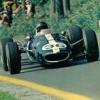The French GP returned to Rouen for the first time since 1957. The weekend before the event most of the F1 regulars took part in a non-championship Reims Grand Prix, which was won by Bruce McLaren in his Cooper. At Rouen the field was rejoined by Porsche which had missed the Belgian GP because of a strike, but Ferrari failed to appear because of industrial action in Italy.
Qualifying resulted in Jim Clark setting the fastest time for Team Lotus with Graham Hill's BRM and McLaren's Cooper alongside on the front row. On the second row Jack Brabham's private Lotus was beside John Surtees's Reg Parnell Lola while the third row featured Dan Gurney's Porsche and the two British Racing Partnership Lotuses: Masten Gregory's BRM-engined car being slightly faster than Innes Ireland's Climax-engined one.
Hill took the lead with Surtees, Clark, McLaren and Brabham chasing him. McLaren dropped out after 10 laps when he spun because of a gear-selection problem and crashed. Brabham retired at the same moment when his suspension failed but McLaren did manage to get going again and spent a long time in the pits having the car repaired. On lap 13 Surtees pitted because of fuel feed problems and he dropped down to eighth place, leaving Hill to be chased by Clark, Gurney, Gregory and Jo Bonnier (Porsche). Gregory and Bonnier soon dropped out of the running with mechanical troubles.
On lap 30 Hill was hit by backmarker Jack Lewis when the privateer Cooper driver suffered brake failure. Clark took the lead but he was in trouble with his suspension and stopped three laps later. This put Hill back in the lead but in the closing laps his BRM began to misfire and he dropped quickly back, leaving Gurney to take the lead. He duly won his first and Porsche's first World Championship victory. Tony Maggs survived to get second in his Cooper while third place went to Ritchie Ginther's BRM, who drove the final laps controlling the throttle by hand after the cable came loose from the pedal. Surtees struggled across the line with gearbox trouble and then slowed dramatically, Maurice Trintignant was caught by surprise by this and had to swerve his Rob Walker Lotus to avoid hitting the Lola. In doing so, the Frenchman moved into the path of Trevor Taylor's Lotus and there was a nasty accident - although both drivers escaped without injury.
Dan, you are my Hero!

















